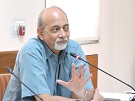On 19 Sep 2016, Amb Dinkar Srivastava, India’s former Ambassador to Iran, conducted a round table discussion on ‘India-Iran relations and the way forward’. The interaction among experts focused on three key issues: terrorism, regional connectivity and India’s oil and gas imports from Iran.
Initiating the discussion, Amb Srivastava pointed out that Iran held great strategic significance for India, both in terms of energy security as also in getting access to Afghanistan and beyond. He stressed that while India’s relations with Iran remained tardy for much of the Cold War period, the bilateral relationship has been progressing steadily since the withdrawal of the erstwhile Soviet Union from Afghanistan.  It may be recalled that both Iran and India collaborated with the Northern Alliance against the Taliban regime in Afghanistan and even while Iran reeled under crippling sanctions, India continued to import crude oil from Iran.
It may be recalled that both Iran and India collaborated with the Northern Alliance against the Taliban regime in Afghanistan and even while Iran reeled under crippling sanctions, India continued to import crude oil from Iran.
Post–sanction, while Iran seeks to emerge as a regional power and mainstream itself into the international order, India finds in Iran a potential stabilizer in Afghanistan. Besides, Iran is increasingly important for India, insofar as keeping an eye on China’s growing activities in the Indian Ocean is concerned. India’s assistance to develop Iran’s Chabahar port, barely 72 nautical miles from Pakistan’s Gawadar port, is largely perceived as India’s answer to Pakistan’s habitual intransigence, provided India walks the extra mile and helps Iran connect the Chabahar port with the hinterland and beyond. The discussion also centered around whether India should limit herself to developing only two berths or take up the development of the entire port.
 Among other important takeaways from the interaction, there was the broader consensus among the experts for increasing India’s investments in Iran, especially in the hydro-carbon sector. It was also broadly agreed that India should not view its relations with Iran as a subset of her relations with other countries. With India putting the spotlight on Pakistan’s gross violations of human rights in Balochistan, its cascading effect on Iran was also discussed. Experts were largely of the view that the Balochistan crisis is likely to remain confined to areas within Pakistan’s territories.
Among other important takeaways from the interaction, there was the broader consensus among the experts for increasing India’s investments in Iran, especially in the hydro-carbon sector. It was also broadly agreed that India should not view its relations with Iran as a subset of her relations with other countries. With India putting the spotlight on Pakistan’s gross violations of human rights in Balochistan, its cascading effect on Iran was also discussed. Experts were largely of the view that the Balochistan crisis is likely to remain confined to areas within Pakistan’s territories.
Significantly, the interaction on Iran was preceded by a quick round-up on the evolving dynamics in the relations between India and Pakistan following the terrorist attack in Uri. Experts largely converged on giving a befitting diplomatic-military response to Pakistan in the wake of Uri attack in which eighteen Indian army personnel were killed and over two dozens injured. The general mood among those present was that ‘enough is enough’.








